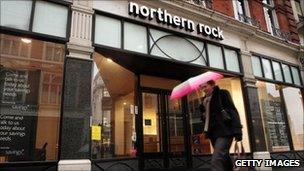Northern Rock rescue 'could cost taxpayer £2bn'
- Published

The NAO accepted that the Treasury had to move swiftly during the financial crisis
The taxpayer could lose about £2bn once the assets of collapsed bank Northern Rock are wound down, the public spending watchdog has estimated.
The National Audit Office also said that taxpayers lost about £480m on the sale of Northern Rock PLC last year.
But the NAO said the sale of the bank to Virgin Money - criticised by some as too early - helped to minimise losses for the taxpayer.
Northern Rock was rescued in 2008 at the start of the financial crisis.
After nationalisation, the bank was split into a mortgage lending and savings arm, Northern Rock PLC, and a "bad bank" of sub-prime assets, Northern Rock Asset Management (NRAM).
The NAO said it could be years before the assets of NRAM were wound down, but its current estimate is that the taxpayer is sitting on a £2bn loss.
But the report says: "This net present cost should, however, be seen as part of the overall cost of securing the benefits of financial stability during the financial crisis."
The NAO's report, which deals specifically with the sale of Northern Rock PLC, concludes that the Treasury took big risks after it rescued the bank in 2008.
Northern Rock PLC was sold Sir Richard Branson's Virgin at the end of 2011, at a loss to the taxpayer estimated by the NAO at £480m.
There was criticism at the time of the sale that the Treasury should have delayed any disposal until market conditions had improved and the taxpayer could get a better return.
But the NAO's head, Amyas Morse, said: "A sale of Northern Rock PLC at the earliest opportunity was the best option to minimise losses on the £1.4bn of public money invested in the bank."
However, the creation of Northern Rock PLC in 2009, which was designed to support UK mortgage lending, carried risks that the Treasury failed to address sufficiently, the NAO said.
While the Treasury's intentions were laudable, Mr Morse said, the department committed itself to splitting the company before "looking in detail at the possible consequences for the taxpayer".
Northern Rock's lending arm was hived off on the basis of a business plan prepared by the bank's management. The NAO report says that "events quickly showed [this plan] to have been optimistic".
Luck, not judgement?
Mr Morse said the bad bank's assets, under the control of Northern Rock Asset Management, would remain "in public ownership for many years to come and there could be a net cost for the taxpayer of some £2bn by the time these assets are finally wound down."
In a statement, Margaret Hodge, chairwoman of the Committee of Public Accounts, accepted that the Treasury had had to act quickly during the financial crisis.
But she said: "Given the scale of the crisis we are fortunate that the net present cost to the taxpayer is potentially not more than £2bn. But this is perhaps more by luck than good judgement."
- Published28 February 2012
- Published18 December 2011